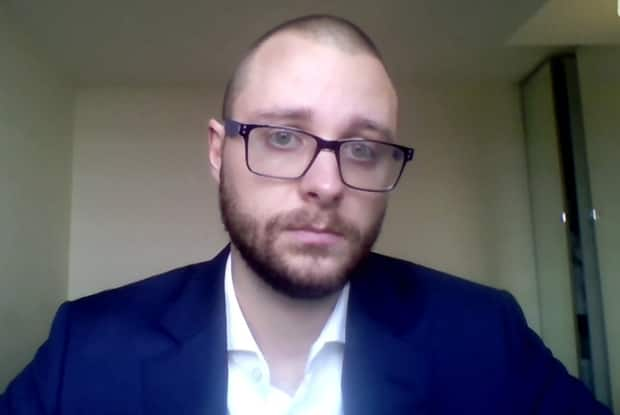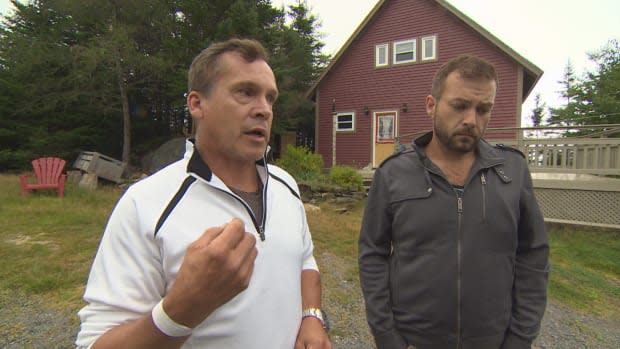Hillview man guilty of shooting at gay couple after yelling slurs — so why isn't it a hate crime?

Harvey Murlin Price hurled homophobic slurs as he reached into his truck, pulled out a shotgun and levelled it at his former brother-in-law and his partner.
He fired two shots as the men threw themselves to the rocky ground for cover.
Both shots missed, sailing somewhere into the trees surrounding a picturesque cabin in Hatchet Cove, a rural settlement on Newfoundland's east coast.
Price is now facing serious jail time, after being convicted on two counts of uttering threats to cause death and five weapons offences related to that day in 2018.
But a question lingers over his upcoming sentencing hearing: Will Price's homophobic motivations net him a longer prison term?
"We're just two people trying to live a normal life and it boggles my mind," said Edison Avery, the former brother-in-law who found himself staring down the barrel of Price's gun.
"Because in my mind, a lot of this is not just a family thing, but a hate crime."
Family dispute turns violent
Avery had once been married to Price's sister. The couple divorced; Avery came out as gay and began openly dating a man.
A dispute began within the family about a cabin in Hatchet Cove, which Avery built while he was married to Price's sister.
Price inserted himself into the disagreement in August 2018, when he called Avery and told him he was going to kill him and his partner, Chris Neal, if he ever saw them in Hatchet Cove again.
On Sept. 2, 2018, the couple was at the cabin when they heard a truck coming down a long and secluded driveway.
Avery confronted Price before he could get out of the truck, telling him to leave and urging him not to do anything stupid.
That's when he spotted the shotgun on the backseat of the truck and yelled out for Neal to take cover.
WATCH | In 2018, Edison Avery and Chris Neal described their encounter with an armed man:
Price got out of the truck with the gun and fired two shots as they ducked for cover. The men then chased him back down the driveway with rocks in their hands.
"We couldn't give him an opportunity to load the gun again," Avery told CBC News three days after the shooting.
Price was arrested at his home in nearby Hillview soon after the shooting.
Why wasn't it a hate crime?
Avery and Neal told CBC News at the time they were disappointed it wasn't being prosecuted as a hate crime.
They're not the first victims of crime to be let down by the judicial process when it comes to violent offences motivated by hatred, according to Evan Balgord, executive director of the Canadian Anti-Hate Network.
"It sucks for most people," Balgord said.
"When somebody is the victim of a hate crime and they're part of a community, they wonder, why isn't this person being charged with a hate crime? Because there isn't one. It doesn't exist."
The Canadian Criminal Code does have three sections on hate crimes, but it only covers vandalism at religious sites, public incitement of hate and publicly advocating for genocide.

The law does not have separate charges for when physical assaults are based on hatred.
Instead, what people typically classify as hate crimes are cases where an accused is charged with something common, like assault, and the Crown prosecutor will urge the judge to consider the hateful motivations when handing down a sentence.
It requires the police to do extra work to prove the person's motive was rooted in something like homophobia or racism.
A recent study by Dr. Barbara Perry at the University of Ontario Institute of Technology showed there were several problems with this system of policing hate crimes.
She polled more than 200 officers involved in reporting hate crimes at eight police departments in Ontario.
Some officers reported they weren't sure if their work actually resulted in longer prison sentences. Some said it was too difficult to prove the leading motivation was hate. Several said the public lacked knowledge on the definition of a hate crime in Canada and it eroded public trust when hate-related charges weren't laid.
Many said they didn't feel it was worth doing the extra work.
"The net result is we actually have no idea how often things are being followed through [with] treating a crime like a hate crime to try and get an enhanced sentence," Balgord said. "There's massive systemic problems here."
Hatchet Cove victims suffering
Avery hopes it's a factor at Price's sentencing hearing, which is scheduled for April 9. Anything that can net a longer prison sentence is good with him.
"I don't wish any ill or harm to his family. They used to be my family," he said. "But reality is reality and this man shouldn't be walking the streets and living his life while I'm living in fear every day."
While neither Avery nor Neal were physically injured in the shooting, the mental scars have taken a toll on the couple.
Avery was a funeral director in St. John's, but hasn't been able to return to work since the shooting. He was diagnosed with post-traumatic stress disorder and now suffers seizures that he had never experienced before Sept. 2, 2018.

He's tried to park the homophobic aspect of the crime and tuck it away in his mind. He's more worried now about his ongoing safety, since Price is still free on bail while awaiting sentencing.
Still, he said an acknowledgement that homophobia was an element would be meaningful.
"It would have made a difference, not so much for me as it would for the gay community," Avery said. "The part that still eats me alive is the charges against this man — I'm glad he's guilty of all charges — but in my mind it's attempted murder .... It's hate."

